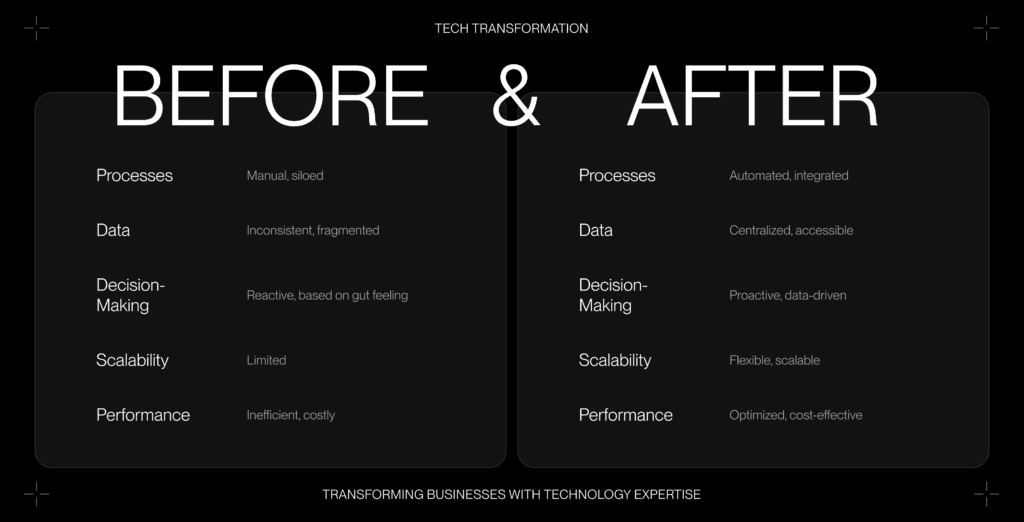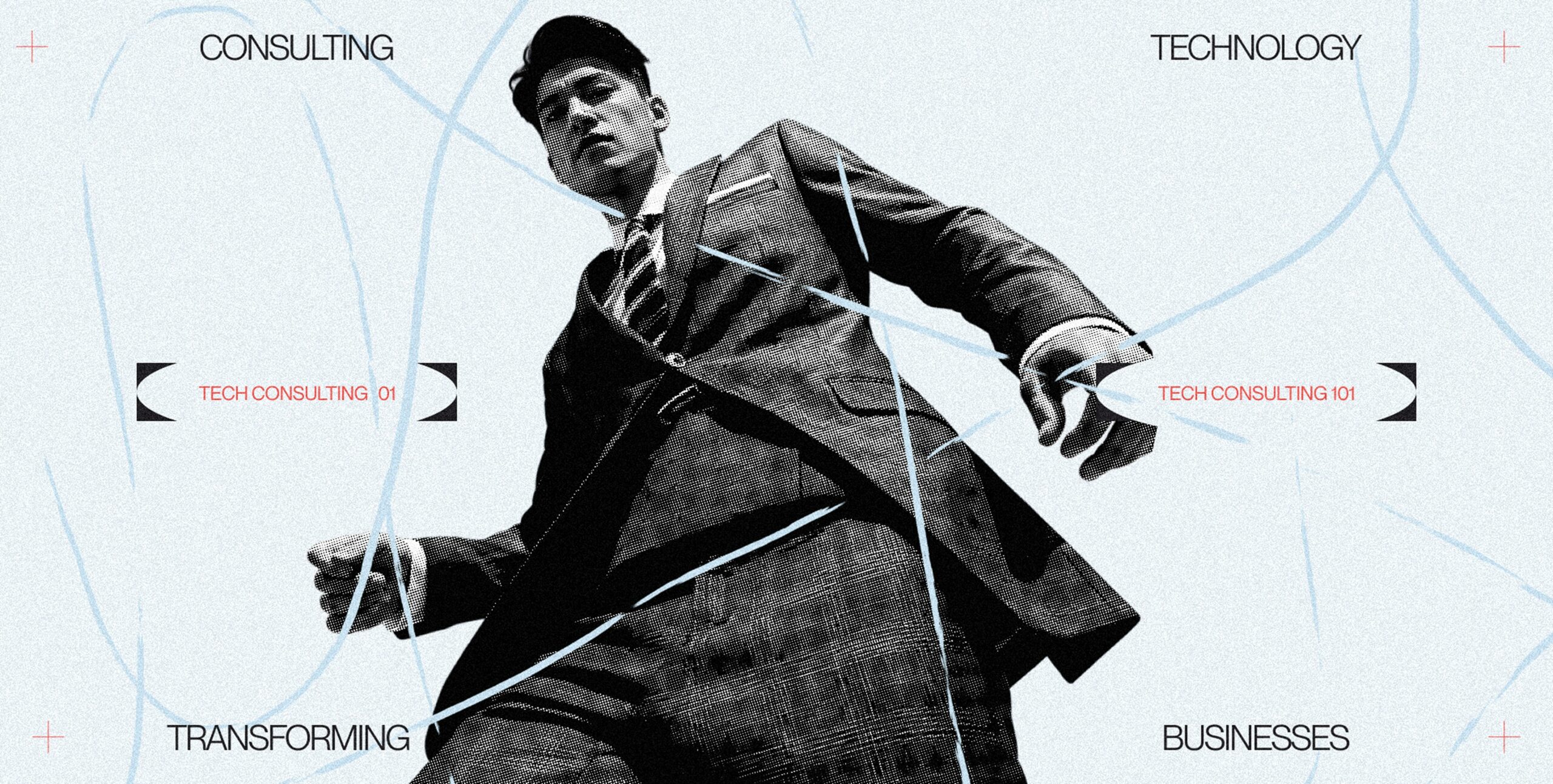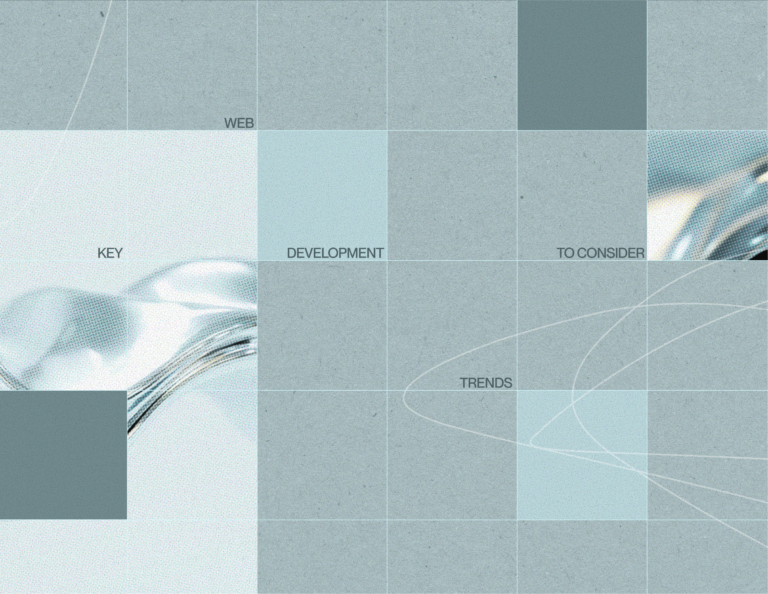Outline:
Technology is the backbone of modern success. Companies that embrace innovation thrive, while those that resist digital transformation risk fading into obscurity. But here’s the catch: technology is evolving at a breakneck pace, and staying ahead requires more than just adopting the latest software or upgrading hardware. It demands strategy, expertise, and a deep understanding of how digital solutions align with business goals.
Enter tech consulting—a game-changer for companies looking to harness technology’s full potential. But what is tech consulting, really? It’s not just about fixing IT issues or recommending software. It’s about crafting a technology roadmap that ensures businesses don’t just keep up but lead the charge in their industries. From fine-tuning digital workflows to architecting next-gen cloud solutions, tech consultants are the unseen strategists behind today’s most successful enterprises.
This guide peels back the layers of IT technology consulting, revealing how it shapes industries, fuels growth, and mitigates risk in an era where digital dominance is key. By the time you reach the final section, you’ll not only understand the power of tech consulting—you’ll see why it’s an indispensable asset for any business looking to future-proof its success.
Understanding the Core: What is Tech Consulting and Why It Matters
Technology is the engine of modern business, but without the right strategy, even the most advanced tools can become costly liabilities. That’s where tech consulting steps in—bridging the gap between innovation and real-world business needs. But what is tech consulting, exactly? It’s more than just IT support or software recommendations. It’s a strategic discipline that aligns technology with business goals, ensuring that every digital move adds measurable value.
Demystifying Tech Consulting: More Than Just IT Support
For years, companies have relied on IT teams to maintain systems, troubleshoot issues, and implement software solutions. But tech consulting takes things further. It’s not about fixing what’s broken—it’s about designing future-proof technology strategies that drive efficiency, growth, and innovation.
A tech consultant evaluates a company’s digital infrastructure, assesses gaps, and recommends tailored solutions that fit its industry, market position, and long-term objectives. Whether it’s IT technology consulting for cloud migration, automation, or cybersecurity, their expertise ensures businesses aren’t just keeping up with change but leading the charge.
Some key areas where tech consulting goes beyond traditional IT support include:
- Strategic Digital Transformation – Developing a long-term technology roadmap.
- Process Optimization – Automating workflows to boost productivity.
- Data-Driven Decision Making – Leveraging analytics for competitive insights.
- Risk Mitigation – Strengthening cybersecurity and compliance measures.
In essence, tech consulting isn’t about technology for technology’s sake—it’s about technology that fuels business growth.
The Role of a Tech Consultant: More Than Just Problem-Solving
If you picture a tech consultant as someone who simply recommends the latest software, you’re underestimating their impact. A great tech consultant acts as:
- A Business Architect: They design scalable digital solutions that align with company goals.
- A Digital Strategist: They ensure technology investments bring tangible ROI.
- A Risk Manager: They identify vulnerabilities before they become major threats.
- A Change Facilitator: They help companies adapt and thrive in a fast-moving tech landscape.
Take IT technology consulting in the realm of cybersecurity as an example. Instead of just implementing firewalls and antivirus software, a tech consultant builds comprehensive cybersecurity frameworks that proactively anticipate threats, enforce compliance, and safeguard critical data.
In other words, tech consultants don’t just solve problems—they prevent them before they even arise. They make sure businesses are equipped with the right tech, at the right time, for the right reasons.
How Tech Consulting Revolutionizes Business Operations
In a world where efficiency and innovation define success, businesses that fail to leverage technology risk stagnation. Tech consulting isn’t just about adopting the latest software; it’s about strategically integrating technology to create measurable improvements in productivity, security, and competitiveness. A skilled tech consultant doesn’t just recommend tools—they redesign workflows, optimize resources, and future-proof businesses for sustained growth.
Unlocking Efficiency: Automating Processes with Technology
Time-consuming, manual processes are the silent profit killers of many businesses. Tech consulting helps organizations identify inefficiencies and implement automation strategies that save time, reduce errors, and increase scalability.
From AI-powered customer service chatbots to automated supply chain management, businesses that embrace automation not only cut costs but also redirect human talent toward high-value tasks. A tech consultant assesses a company’s operational landscape and recommends automation solutions tailored to its needs, ensuring a seamless integration of digital tools without disrupting workflows.
Competitive Advantage Through Digital Transformation
In the modern market, technology is a key differentiator. Companies that rely on outdated systems struggle to keep pace, while those that embrace IT technology consulting gain a competitive edge. A well-executed digital transformation strategy can:
- Improve customer experience through seamless digital interactions
- Optimize data analytics to drive better business decisions
- Enhance operational agility, allowing businesses to pivot quickly in response to market changes
Tech consulting enables businesses to take a proactive approach to digital transformation, ensuring that investments in technology align with long-term goals rather than short-term fixes.
Cybersecurity and Risk Management: Keeping Businesses Safe
As cyber threats become more sophisticated, businesses must stay ahead of potential risks. A tech consultant plays a critical role in building comprehensive security strategies that safeguard sensitive data, protect against breaches, and ensure regulatory compliance.
Key areas where IT technology consulting strengthens cybersecurity include:
- Identifying vulnerabilities through risk assessments
- Implementing advanced security protocols and encryption
- Developing incident response plans to minimize downtime in case of breaches
- Ensuring compliance with data protection regulations
By integrating cybersecurity into the core of business operations, companies not only protect themselves from financial and reputational damage but also build trust with customers and stakeholders.
Tech consulting isn’t just about keeping up with trends—it’s about using technology as a strategic asset to drive efficiency, enhance security, and secure a dominant market position.

Different Types of Tech Consulting Services Explained
Tech consulting is not a one-size-fits-all solution. Different businesses have different needs, and the role of a tech consultant varies depending on the industry, company size, and digital maturity. From optimizing IT infrastructure to driving large-scale digital transformation, tech consulting covers a broad spectrum of services, each designed to solve specific challenges and unlock new opportunities.
IT Infrastructure Consulting: Building a Future-Proof Tech Stack
A company’s IT infrastructure is the foundation of its digital ecosystem. If it’s outdated, inefficient, or poorly integrated, it can create bottlenecks that slow down growth. Tech consulting helps businesses assess their current infrastructure and implement scalable, high-performance solutions that support both current and future business needs.
Key aspects of IT infrastructure consulting include:
- Cloud vs. On-Premises Solutions – Determining the best deployment model for flexibility, security, and cost-efficiency
- Network Optimization – Enhancing speed, reliability, and scalability of internal systems
- System Integration – Ensuring different software and platforms work seamlessly together
- Disaster Recovery Planning – Creating backup and recovery strategies to minimize downtime
With IT technology consulting, businesses can modernize their IT foundations, ensuring they stay agile and resilient in an evolving market.
Software Development Consulting: Choosing the Right Tech Stack
With a growing number of programming languages, frameworks, and development methodologies, choosing the right tech stack is a major challenge. A tech consultant provides guidance on architecture, scalability, and best practices, ensuring that software solutions are both future-proof and business-aligned.
Tech consulting in software development helps businesses:
- Select the most suitable programming languages and frameworks
- Optimize system architecture for performance and scalability
- Implement DevOps practices to streamline deployment and updates
- Ensure security is built into development from the ground up
A tech consultant ensures that businesses don’t just build software—they build high-performance, secure, and scalable solutions that drive long-term success.
Cloud Consulting: Shifting to Scalable and Secure Cloud Solutions
Cloud computing has become a cornerstone of modern business operations, offering flexibility, cost savings, and remote accessibility. However, migrating to the cloud without a solid strategy can lead to inefficiencies, security risks, and unexpected costs.
Cloud consulting services help businesses:
- Choose between public, private, and hybrid cloud solutions
- Optimize cloud costs and resource allocation
- Enhance security and compliance in cloud environments
- Develop cloud-native applications that maximize performance
A well-planned cloud strategy reduces IT overhead, increases agility, and enhances data accessibility, making businesses more competitive in an increasingly digital world.
AI and Data Analytics Consulting: Turning Raw Data into Business Intelligence
Data is one of the most valuable assets a business can have—but without the right tools and expertise, it remains underutilized. AI and data analytics consulting help businesses harness the power of machine learning, predictive analytics, and real-time data processing to gain a competitive edge.
Core areas of AI and data consulting include:
- Business Intelligence Implementation – Helping companies extract actionable insights from their data
- AI-Driven Automation – Using AI for customer service, marketing automation, and operational efficiency
- Predictive Analytics – Forecasting trends and consumer behavior
- Data Security and Compliance – Ensuring sensitive information is protected and used ethically
Through AI and analytics consulting, businesses can move from intuition-based decisions to data-driven strategies, leading to better outcomes and optimized performance.
Digital Strategy and Transformation: Aligning Tech with Business Goals
Digital transformation is more than just adopting new technology—it’s about rethinking business models, customer interactions, and operational workflows to thrive in a digital-first world. A tech consultant plays a crucial role in guiding businesses through this transformation, ensuring that technology investments align with business objectives.
Key areas of digital transformation consulting include:
- Customer Experience Enhancement – Using digital tools to create seamless, engaging user experiences
- Process Automation – Streamlining operations to reduce costs and improve efficiency
- New Revenue Models – Leveraging technology to create new business opportunities
- Change Management – Ensuring smooth transitions and employee adoption of new technologies
Tech consulting doesn’t just help businesses adapt to digital change—it helps them leverage technology as a strategic advantage to outperform competitors.
Each of these consulting services plays a critical role in driving innovation, improving efficiency, and positioning businesses for long-term success. A skilled tech consultant understands how to tailor these solutions to meet the unique needs of each company, ensuring that technology works as a growth enabler, not just an operational necessity.
How to Choose the Right Tech Consultant for Your Business
Not all tech consultants are created equal. The right expert can revolutionize your business, while the wrong one can lead to wasted time, resources, and costly setbacks. With IT technology consulting covering everything from infrastructure upgrades to AI integration, it’s crucial to choose a consultant who understands your industry, business goals, and long-term vision.
01 Evaluating Experience and Industry Expertise
A tech consultant needs more than just technical skills—they must have a deep understanding of your industry’s unique challenges and opportunities. Before hiring, assess their experience in similar business environments to ensure they can deliver solutions that align with your objectives.
Consider the following when evaluating a consultant’s expertise:
Industry Experience
Have they worked with businesses in your sector? Their familiarity with industry-specific regulations, trends, and pain points can be invaluable.
Technical Specialization
Do they specialize in the technologies you need? Whether it’s cloud computing, AI, or cybersecurity, their expertise should match your requirements.
Track Record of Success
Can they demonstrate measurable results from past projects? Look for case studies, testimonials, or performance metrics.
Problem-Solving Approach
How do they handle complex challenges? A great tech consultant should be able to anticipate potential risks and propose strategic solutions.
Certifications and Credentials
Are they certified in relevant technologies or methodologies? Recognized industry certifications can indicate a higher level of expertise.
02 The Consulting Process: What to Expect
Hiring a tech consultant isn’t just about getting advice—it’s about creating a roadmap for sustainable growth. A structured consulting process ensures that IT technology consulting engagements are productive and result-driven.
Most consulting engagements follow these key phases:
- Initial Assessment
The consultant evaluates your current technology landscape, identifies gaps, and understands your business objectives.
- Strategic Planning
A tailored strategy is developed, outlining short-term and long-term technology improvements.
- Solution Implementation
The consultant guides or oversees the deployment of recommended technologies, ensuring seamless integration.
- Optimization and Fine-Tuning
After implementation, adjustments are made to maximize efficiency, security, and performance.
- Training and Knowledge Transfer
Employees receive training to ensure smooth adoption and ongoing management of the new systems.
- Performance Monitoring and Ongoing Support
Continuous assessment and optimization keep the technology aligned with business growth.
03 Red Flags: Avoiding the Wrong Tech Consulting Firm
Not all tech consultants are equally competent. Choosing the wrong partner can lead to misaligned strategies, overspending, and implementation failures. Watch for these red flags when evaluating a tech consulting firm:
Lack of Industry-Specific Experience
A consultant who lacks experience in your industry may struggle to provide relevant and effective solutions.
Overpromising Without Clear Execution Plans
If a consultant guarantees unrealistic results without outlining a clear strategy, proceed with caution.
Lack of Transparency in Pricing
Unclear pricing models or hidden fees can lead to cost overruns. Ensure all costs are outlined upfront.
No Case Studies or Client References
If a consultant cannot provide real-world success stories, it’s a sign they may not have the expertise they claim.
One-Size-Fits-All Approach
Avoid consultants who offer generic solutions rather than tailored strategies specific to your business needs.
Poor Communication or Slow Response Times
If a consultant is difficult to reach or does not provide clear answers, collaboration may be challenging.
Future Trends in Tech Consulting: What’s Next?
The landscape of tech consulting is constantly evolving as emerging technologies reshape business strategies. Companies that embrace these changes stay ahead, while those that resist fall behind. Understanding where IT technology consulting is headed can help businesses make informed decisions and position themselves for long-term success.
The Rise of AI and Automation in Tech Consulting
Artificial intelligence and automation are no longer futuristic concepts—they are actively transforming tech consulting by streamlining operations, improving decision-making, and enhancing efficiency. Businesses looking to maximize their technology investments should consider how AI-powered consulting can provide deeper insights and predictive analytics.
Key AI-driven trends in tech consulting include:
- Automated IT Audits
AI-driven tools can quickly assess a company’s tech stack, identifying inefficiencies and security vulnerabilities.
- Predictive Analytics for Business Strategy
Machine learning models can anticipate market shifts and customer behaviors, helping businesses adjust strategies in real-time.
- AI-Powered Chatbots and Virtual Assistants
Consultants increasingly use AI-driven support systems to provide faster, 24/7 guidance for businesses.
- Robotic Process Automation
Automating repetitive tasks reduces human workload and improves efficiency across industries.
- Smart Cybersecurity Solutions
AI enhances threat detection by analyzing vast amounts of data to identify and neutralize cyber threats before they escalate.
The Growing Demand for Sustainable and Ethical Technology Consulting
Sustainability is no longer optional—it’s a competitive advantage. As businesses face increasing pressure to reduce their environmental impact, tech consultants play a vital role in implementing eco-friendly solutions that align with both business goals and regulatory requirements.
Key sustainability trends in tech consulting include:
- Green Cloud Computing
Optimizing data centers for energy efficiency and reducing carbon footprints.
- Sustainable Software Development
Encouraging lean coding practices to reduce unnecessary processing power consumption.
- Digital Carbon Footprint Tracking
Implementing tools that monitor and minimize a company’s environmental impact.
- Lifecycle Management for IT Assets
Extending the usability of hardware and minimizing electronic waste.
- Ethical AI and Responsible Data Usage
Ensuring AI systems operate transparently and fairly, reducing bias and ethical concerns.
The Expanding Role of Virtual and Remote Tech Consulting
The shift toward remote work has reshaped tech consulting, making virtual consulting a mainstream approach rather than a temporary solution. Businesses are now able to access top-tier tech consultants worldwide without geographical limitations.
Key trends in virtual consulting include:
- Cloud-Based Collaboration Tools
Tech consultants use digital platforms to provide real-time solutions regardless of location.
- Remote IT Assessments
AI-powered diagnostics allow consultants to evaluate IT infrastructures without needing on-site visits.
- Virtual Cybersecurity Training
Online security workshops help businesses educate employees on emerging threats.
- Hybrid Consulting Models
Combining remote and in-person consulting for cost efficiency and flexibility.
- Asynchronous Consulting
Consultants deliver insights and recommendations via digital reports and dashboards, eliminating the need for scheduled meetings.
On a Final Note
The future belongs to businesses that strategically integrate technology into their core operations. Tech consulting is no longer just an added service—it’s a critical investment for companies looking to drive efficiency, enhance security, and stay ahead of digital disruption. Whether it’s leveraging AI for automation, adopting sustainable IT practices, or embracing remote consulting models, businesses that prioritize IT technology consulting gain a significant competitive advantage. The right tech consultant helps organizations not only adopt cutting-edge solutions but also align them with long-term business goals, ensuring scalability and resilience in an unpredictable market.
Success in today’s digital world requires more than just technology—it requires the right strategy, expertise, and execution. Businesses that partner with experienced tech consultants can navigate complex challenges, optimize their digital ecosystems, and future-proof their operations. If you’re ready to harness technology to transform your business, contact us to explore how expert tech consulting can help you achieve your goals.





